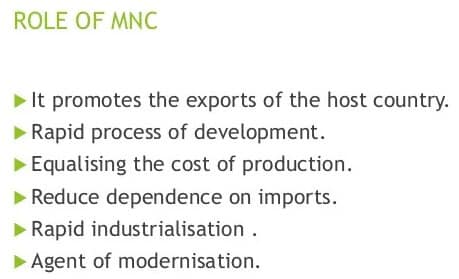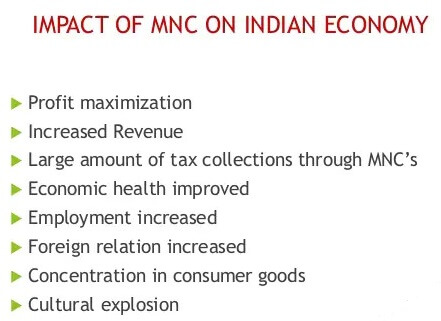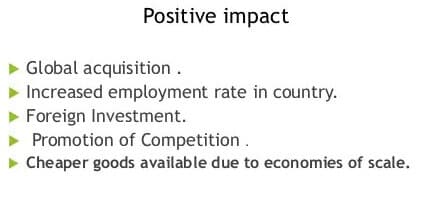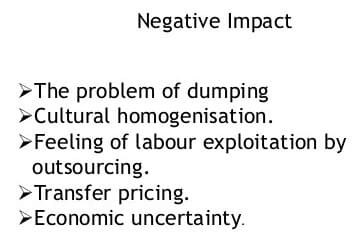In this article, You will read the Multinational Companies of India and Characteristics, Growth, Role, and Criticisms of Multinational Companies in India – for UPSC (Industry – Geography of India).
Multinational Companies
- A Multinational Company (MNCs) or Transnational Corporation (TNC), or Multinational Enterprise (MNE) is a business organization whose operations are carried on in more than one country (other than the home country).
- Multinational Corporations (MNCs) operate their business simultaneously in different countries of the world. MNCs have their main offices (headquarters) in their home country, and secondary offices, assets, factories in other countries (known as host countries).
- MNCs operate worldwide and hence, are also known as global enterprises.
- They are multi-process and multi-product enterprises. A few examples of MNCs, are Sony of Japan, IBM of USA, Siemens of Germany, Videocon and ITC of India, etc. There are over 40,000 MNCs with over 2, 50,000 overseas affiliates. The top 300 MNCs control over 25 percent of the world economy.
- Previously American-based multinationals ruled the world, but today, many Japanese, Korean, European, and Indian multinational companies have spread their wings in many parts of the world.
- Before entering into any country, at the headquarters of MNCs, experts from various fields such as political science, economics, commerce international trade, and diplomacy are analyzing the business environment of a country and advising the top management.
Characteristics of Multinationals
MNCs will always lookout for opportunities. They carry out risk analysis and send their personnel to learn and understand the business climate. They develop expertise in understanding the culture, politics, economy, and legal aspects of the country that they are planning to enter.
The essential element that distinguishes the true multinational is its commitment to manufacturing, marketing, developing R&D, and financing opportunities throughout the world, rather than just thinking of the domestic situation.
Some of the characteristics of MNCs are:
- Management by Professionals – MNCs recruits suitable managers to take care of their business operations, technology, finances, external affairs, etc.
- Control – MNCs business operations in the host country have their own management and offices, but the ultimate control will still remain in the hands of head office (home country).
- Huge Assets & Turnover – Because MNCs operates on a global basis, they have huge physical and financial assets. For example: Market capitalization of Microsoft Corp. is 1000.76B
- Advanced Technology – MNCs regulates on advanced and sophisticated technology. It employs capital intensive technology in manufacturing and marketing.
- Mode of Transfer:
- The MNC has considerable freedom in selecting the financial channel through which funds or profits or both are moved, e.g., patents and trademarks can be sold outright or transferred in return through the contractual binding on royalty payments.
- Similarly, the MNC can move profits and cash from one unit to another by adjusting transfer prices on intercompany sales and purchases of goods and services. MNCs can use these various channels, singly or in combination, to transfer funds internationally, depending on the specific circumstances encountered.
- Value for Money:
- By shifting profits from high-tax to low-tax nations, MNCs can reduce their global tax payments. In addition, they can transfer funds among their various units, which allow them to circumvents currency controls and other regulations and to tap previously inaccessible investment and financing opportunities.
- Flexibility:
- Some to the internationally generated claims require a fixed payment schedule; other can be accelerated or delayed. MNCs can extend trade credit to their other subsidiaries through open account terms, say from 90 to 180 days. This give a major leverage to financial status. In addition, the timing for payment of fees and royalties may be modified when all parties to the agreement are related.

Reasons for the Growth of MNCs
- Non-Transferable Knowledge:
- It is often possible for an MNC to sell its knowledge in the form of patent rights and to license foreign producers. This relieves the MNC of the need to make foreign direct investments.
- However, sometimes an MNC that has a Production Process or Product Patent can make a larger profit by carrying out the production in a foreign country itself. The reason for this is that some kinds of knowledge cannot be sold and which are the result of years of experience.
- Exploiting Reputations:
- In some situations, MNCs invest to exploit their reputation rather than protect their reputation. This motive is of particular importance in the case of foreign direct investment by banks because in the banking business an international reputation can attract deposits.
- If goodwill is established the bank can expand and build a strong customer base. Quality service to a large number of customers is bound to ensure success. This probably explains the tremendous growth of foreign banks such as Citibank, Grind-lays, and Standard Chartered in India.
- Protecting Reputations:
- Normally, products, develop a good or bad name, which transcends international boundaries. It would be very difficult for an MNC to protect in reputation if a foreign licensee does an inferior job. Therefore, MNCs prefer to invest in a country rather than licensing and transfer expertise, to ensure the maintenance of their good name.
- Protecting Secrecy:
- MNCs prefer direct investment, rather than granting a license to a foreign company if protecting the secrecy of the product is important. While it may be true that a license will take precautions to protect patent rights, it is equally true that it may be less conscientious than the original owner of the patent.
- Availability of Capital:
- The fact that MNCs have access to capital markets has been advocated as another reason why firms themselves moved abroad. A firm operating in only one country does not have the same access to cheaper funds as a larger firm. However, this argument, which has been put forward for the growth of MNCs has been rejected by many critics.
- Product Life Cycle Hypothesis:
- It has been argued that opportunities for further gains at home eventually dry up. To maintain the growth of profits, a corporation must venture abroad where markets are not so well penetrated and where there is perhaps less competition.
- This hypothesis perfectly explains the growth of American MNCs in other countries where they can fully exploit all the stages of the life cycle of a product. A prime example would be Gillette, which has revolutionized the shaving systems industry.
- Avoiding Tariffs and Quotas:
- MNCs prefer to invest directly in a country in order to avoid import tariffs and quotas that the firm may have to face if it produces the goods at home and ships them. For example, a number of foreign automobile and truck producers opened plants in the US to avoid restrictions on selling foreign-made cars. Automobile giants like. Fiat, Volkswagen, Honda, and Mazda are entering different countries not with the products but with technology and money.
- Strategic FDI:
- The strategic motive for making investments has been advocated as another reason for the growth of MNCs. MNCs enter foreign markets to protect their market share when this is being threatened by the potential entry of indigenous firms or multinationals from other countries.
- Symbiotic Relationships:
- Some firms have followed clients who have made direct investments. This is especially true in the case of accountancy and consulting firms. Large US accounting firms, which know the parent companies’ special needs and practices have opened offices in countries where their clients have opened subsidiaries.
- These US accounting firms have an advantage over local firms because of their knowledge of the parent company and because the client may prefer to engage only one firm in order to reduce the number of people with access to sensitive information. Templeton, Goldman Sachs, and Earnest and Young are moving with their clients even to small countries like Sri Lanka, Panama, and Mauritius.
Country Risk
- When making over direct investment it is necessary to allow for risk due to investments being made in a foreign country. Country risk is one of the special issues faced by MNCs when investing abroad. It involves the possibility of losses due to country-specific economic, political, and social events.
- Among the country risks that are faced by MNCs are those related to the local economy, those due to the possibility of confiscation i.e. Government takes over without any compensation, and those due to expropriation i.e., Government takeover with compensation which at times can be generous. In addition, there are the political/social risks of wars, revolutions, and insurrections.
- Even though none of these latter events are specifically directed towards MNC by the foreign government, they can damage or destroy an investment. There are also risks of currency non-convertibility and restrictions on the repatriation of income. International magazines like Euro Money and the Economist regularly conduct country risk evaluations in order to facilitate MNCs.
Methods of Reducing Country Risk and Control
- Controlling Crucial Elements of Corporate Operations:
- Most of the MNCs try to prevent operations in developing countries by other local entities without their cooperation. This can be achieved if the company maintains control of an element of operations.
- For example, food and soft drink manufacturers keep their special ingredients secret. Automobile companies may produce vital parts such as engines in some other country and refuse to supply these parts if their operations are seized.
- Programmed Stages of Planned Disinvestment:
- There is an alternative technique to hand over ownership and control to local people in the future. This is sometimes a requirement of the host government. There is a calculated move to involve themselves in stages.
- Joint Ventures:
- Instead of promising shared ownership in the future, an alternative technique for reducing the risk of expropriation is to share ownership with private or official partners in the host country from the very beginning.
- Such shared ownerships, known as joint ventures rely on the reluctance of local partners, if private, to accept the interference of their own Government as a means of reducing expropriation.
- When the partner is the government itself, the disincentive to expropriation is concerned over the loss of future investments. Multiple joint ventures in different countries reduce the risk of expropriation, even if there is no local participation. If the government of one country does expropriate the business, it faces the risk of being isolated simultaneously by numerous foreign powers.
Problems from the Growth of MNCs
- Much of the concern about MNCs stems from their size, which can be formidable. MNCs may impose on their host governments to the advantages of their own shareholders and the disadvantages of citizens and shareholders in the country of shareholders in the past.
- It can be difficult to manage economics in which MNCs have extensive investments. Since MNCs often have ready access to external sources of finance, they can blunt local monetary policy. When the Government wishes to constrain any economic activity, MNCs may nevertheless expand through foreign borrowing.
- Similarly, efforts at economic expansion may be frustrated if MNCs move funds abroad in search of advantages elsewhere. Although it is true that any firm can frustrate plans for economic expansion due to integrated financial markets, MNCs are likely to take advantage of any opportunity to gain profits.
- As we have seen, MNCs can also shift profits to reduce their total ‘tax burden by showing larger profits in countries with lower tax rates citizens and shareholders in the country of shareholders in the past.
Multinational Companies of India
MNCs have been operating in India even prior to Independence, like Singer, Parry, Philips, Unit- Lever, Proctor, and Gamble. They either operated in the form of subsidiaries or entered into collaboration with Indian companies involving the sale of technology as well as the use of foreign brand names for the final products.
The entry of MNCs in India was controlled by existing industrial policy statements, MRTP Act, and FERA. In the pre-reform period, the operations of MNCs in India were restricted.
Best Multinational Companies in India
Microsoft
- Microsoft currently has offices in the 9 cities of Ahmedabad, Bangalore, Chennai, Hyderabad, Kochi, Kolkata, Mumbai, the NCR (New Delhi and Gurugram), and Pune. It is the No.1 amongst the best 25 multinational companies in India.
Apple Inc
- Major products are Macintosh, iPod, iPhone, Apple Watch, Apple TV, iOS, tvOS, iLife, iWork, Logic Pro, etc. Apple is an equal opportunity employer that is committed to inclusion and diversity.
IBM (International Business Machines Corporation)
- Its offerings are included in different categories such as cognitive computing, data and analytics, Internet of Things, Mobile, Security, and Infrastructure. IBM India provides facilities in Bengaluru, Ahmedabad, Delhi, Kolkata, Mumbai, Chennai, Pune, Gurugram, Noida, Bhubaneshwar, Coimbatore, Visakhapatnam, and Hyderabad.
- Google India has its branches in Bangalore, Mumbai, Gurugram, and Hyderabad. It has a lot of job opportunities in Software Engineering & Developments, Operations, Product Management, Technical Client-Facing, Sales and Account Management, Product and Customer Support, Sales Operations, and Business Strategy.
Amazon
- Its major products are Amazon Appstore, Amazon Echo, Amazon Kindle, Amazon Prime, Amazon Video, ComiXology, etc. It has job openings in Bangalore, Delhi, Chennai, Hyderabad, and Mumbai.
The Coca-Cola Co.
- The Coca-Cola Co. is a well-known soft drinks brand and also a market leader into the field of soft drinks. They offer different variants like Diet Coke, Coca Cola Cherry, Coca Cola Life, Coca Cola Citra, etc.
Pepsi Co.
- Their brands include Pepsi, Lays Potato Chips, Seven Up, Mountain Dew, Tropicana, Mirinda, etc. Pepsi Co headquarters is in New York and headed by Indira Nooyi (former Chairman & CEO).
Mahindra Group
- Mahindra Group (headquartered in Mumbai) has a presence in aerospace, agribusiness, aftermarket, automotive, components, construction equipment, defense, energy, farm equipment, finance and insurance, industrial equipment, information technology, leisure and hospitality, logistics, real estate, retail, & two-wheelers.
Procter & Gamble
- P&G made its way into India in 1964 and currently has various products such as Olay, Gillette, Vicks, Tide, etc. It has a wide range of products including beauty, grooming health and household care, etc.
Sony Corporation
- A well-known Japanese Multinational Company dealing in televisions, mobile phones, cameras, PlayStations, headphones and memory cards, etc.
- Its headquarter is situated in Delhi, India.
Samsung
- Samsung is undoubted, the world’s largest manufacturer of smartphones. Samsung was founded in the year 1938 in Daegu, Japanese Korea. It holds its place every time whenever the topic best 25 multinational companies in India is raised.
TATA Group (TCS & TATA Motors)
- TATA Motors’ products include passenger cars, trucks, vans, coaches, buses, sports cars, construction equipment, and military vehicles.
- TCS is an Indian multinational information technology (IT) service and consulting company and also the second-largest Indian company by market capitalization.
Infosys
- NIA (Next Generation Integrated AI Platform), Infosys Consulting for global management solutions, Infosys Information Platform, Edge Verve Systems, and Panaya Cloud Suite. Headquartered in Bangalore, India, Infosys has offices in the USA, China, Middle East, Japan, and Europe.
Accenture
- Accenture is a global management consulting & professional services firm that provides strategy, consulting, digital, technology & operations services. In 2015, the company hired around 150,000 employees in India.
Nestlé
- Nestlé’s products include baby food, medical food, bottled water, breakfast cereals, coffee and tea, confectionery, dairy products, ice cream, frozen food, pet foods, and snacks. It is the largest food company in the world, measured by revenues and other metrics, since 2014.
Aditya Birla Group
- Aditya Birla Group is an Indian multinational conglomerate, headquartered in Mumbai. It operates in 35 countries with more than 120,000 employees worldwide. Sectors include viscose staple fiber, metals, cement, viscose filament yarn, branded apparel, carbon-black, chemicals, fertilizers, insulators, financial services, telecom, BPO, and IT services.
Hewlett Packard Enterprise
- HP, an American Electronics and IT Company, has its headquarters in Banglore, India. HP produces a line of printers, digital cameras, scanners, PDAs, calculators, servers, workstation computers, and computers for home and small-business purposes.
Deloitte
- Deloitte provides audit, tax, consulting, enterprise risk & financial advisory services with more than 2,86,200 professionals globally. In the financial year 2018, the network earned a record $43.2 billion USD in aggregate revenues and of course, it has made it to the list of the best 25 multinational companies in India.
Dell
- Dell sells personal computers (PCs), servers, data storage devices, network switches, software, computer peripherals, HDTVs, cameras, printers, MP3 players, and electronics. Dell is one of the largest technological corporations in the world, employing nearly 1,45,000 people in the U.S. and around the world.
Unilever
- Major products include foods, beverages, personal care, and cleaning agents. It is one of the oldest multinational companies. It has research and development facilities in the United Kingdom, Netherlands, China, India, and United States.
CITI Group
- It operates in India through the subsidiary, Citibank, which presently has more than 40 branches in over 30 cities in India. It now owns the world’s largest financial services.
LTI
- LTI positioned as a Leader in Zinnov Zones 2018 for IoT Technology Services. Institutional Investor Magazine ranked LTI CEO & MD, Sanjay Jalona, among the Best CEOs in Technology. The company has 39 offices in 27 countries.
Nike Inc.
- Nike is engaged in design, development, manufacturing, and worldwide marketing and sales of footwear, apparel, equipment & accessories. Nike’s Japan and Asia-Pacific-based offices are home to thousands of employees across Japan, Korea, India, Singapore, Malaysia, Indonesia, Vietnam, Thailand, Sri-Lanka, South Africa, New Zealand, and Australia.
Johnson & Johnson
- Johnson & Johnson Pvt. Limited is organized into 3 business segments: Consumer Healthcare, Medical Devices, and Pharmaceuticals in India. It ranked No.37 on the 2018 Fortune 500 list of the largest United States corporations by total revenue.
Adidas
- Adidas designs and manufactures shoes, clothing, and accessories. It is the second-largest in the world, after Nike. Adidas has its headquarters in Gurugram, Haryana. Adidas India hopes to double its revenue from Rs.805 crores by 2020.
New Industrial Policy 1991 and Multinational Corporations
- The New Industrial Policy 1991, removed the restrictions of entry to MNCs through various concessions. The amendment of FERA in 1993 provided a further concession to MNCs in India.
- At present MNCs in India can–
- Increase foreign equity up to 51 percent by remittances in foreign exchange in specified high priority areas. Subsequently, MNCs are free to own a majority share inequity in most products.
- Borrow money or accept deposits without the permission of the Reserve Bank of India.
- Transfer shares from one non-resident to another non-resident.
- Disinvest equity at market rates on stock exchanges.
- Go for 100 percent foreign equity through the automatic route in Specified sectors.
- Deal in immovable properties in India.
- Carry on in India any activity of trading, commercial or industrial except a very small negative list.
- Thus, MNCs have been placed at par with Indian Companies and would not be subjected to any special restrictions under FERA.
Role of Multinational Corporations in the Indian Economy
- Prior to 1991 Multinational companies did not play many roles in the Indian economy. In the pre-reform period, the Indian economy was dominated by public enterprises.
- To prevent concentration of economic power industrial policy 1956 did not allow the private firms to grow in size beyond a point. By definition, multinational companies were quite big and operate in several countries.
- While multinational companies played a significant role in the promotion of growth and trade in South-East Asian countries they did not play many roles in the Indian economy where the import-substitution development strategy was followed. Since 1991 with the adoption of industrial policy of liberalization and privatization rote of private foreign capital has been recognized as important for the rapid growth of the Indian economy.
- Since the source of the bulk of foreign capital and investment are a multinational corporations, they have been allowed to operate in the Indian economy subject to some regulations.
- The following are the important reasons for this change in policy towards multinational companies in the post-reform period.
- Promotion Foreign Investment
- Non-Debt Creating Capital inflows
- Technology Transfer
- Promotion of Exports



Criticisms against MNCs in India
- The operations of MNCs in India have been opposed on the following grounds:
- They are interested more in mergers and acquisitions and not in fresh projects.
- They have raised a very large part of their financial resources from within the country.
- They supply second-hand plants and machinery declared obsolete in their country.
- They are mainly profit-oriented and have short term focus on quick profits. National interests and problems are generally ignored.
- They use expatriate management and personnel rather than competitive Indian Management.
- Though they collect most of the capital from within the country, they have repatriated huge profits to their mother country.
- They make no effort to adopt an appropriate technology suitable to their needs. Moreover, the transfer of technology proves very costly.
- Once an MNC gains a foothold in a venture, it tries to increase its holding in order to become a majority shareholder.
- Further, once financial liberalizations are in place and free movement is allowed, MNCs can destabilize the economy.
- They prefer to participate in the production of mass consumption and non-essential items.

role of mnc in regional development you can add this point and elaborate that.
2nd paper is focusing more on that
by the way nice research and start a daily based geography optional answer writing